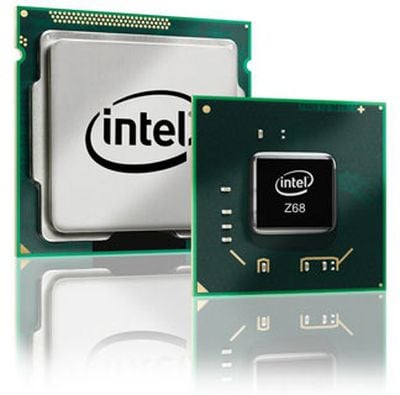Apple Gains Early Access to Intel's Z68 Chipset for New iMacs
As
noted by tonymacx86 (
via 9 to 5 Mac), iFixit's
teardown of the new iMac released earlier this week reveals that the machine utilizes Intel's BD82Z68 platform controller. The inclusion is notable in part because the Z68 chipset is reportedly not set for public introduction until
next week.
Apple use of the Z68 chipset marks yet another exclusive for the company, which has occasionally been granted early access to forthcoming chip components ahead of public unveilings and competitors' offerings.
The Z68 chipset is also notable because it supports SSD caching, a system that marries conventional hard drives to small solid-state drives (SSDs) to provide a seamless user experience with increased performance as the most frequently-accessed files are placed on the speedy SSD.
Apple of course offers SSD options in its iMacs, either as a replacement for or in addition to the traditional hard drive included as standard. The iMac's SSD, however, is a full 256 GB drive rather than the much smaller-capacity drives envisioned for SSD caching. And while Apple doesn't seem to be supporting true SSD caching in the new iMacs, the company achieves a similar but less seamless effect by installing the operating system and applications on the SSD while leaving the traditional hard drive for media on systems configured with both types of drives.
Intel is reportedly preparing to launch its own "Larsen Creek" line of SSDs with capacities around 20 GB and specifically designed to support seamless SSD caching when paired with a traditional hard drive and a compatible chipset such as the Z68. It is unclear if Apple will be looking to incorporate such systems in future hardware, but the company is clearly interested in pursing SSD technology for its performance benefits.
Popular Stories
Apple hasn't updated the AirPods Pro since 2022, and the earbuds are due for a refresh. We're counting on a new model this year, and we've seen several hints of new AirPods tucked away in Apple's code. Rumors suggest that Apple has some exciting new features planned that will make it worthwhile to upgrade to the latest model.
Subscribe to the MacRumors YouTube channel for more videos.
Heal...
In 2020, Apple added a digital car key feature to its Wallet app, allowing users to lock, unlock, and start a compatible vehicle with an iPhone or Apple Watch. The feature is currently offered by select automakers, including Audi, BMW, Hyundai, Kia, Genesis, Mercedes-Benz, Volvo, and a handful of others, and it is set to expand further.
During its WWDC 2025 keynote, Apple said that 13...
Popular accessory maker Anker this month launched two separate recalls for its power banks, some of which may be a fire risk.
The first recall affects Anker PowerCore 10000 Power Banks sold between June 1, 2016 and December 31, 2022 in the United States. Anker says that these power banks have a "potential issue" with the battery inside, which can lead to overheating, melting of plastic...
Chase this week announced a series of new perks for its premium Sapphire Reserve credit card, and one of them is for a pair of Apple services.
Specifically, the credit card now offers complimentary annual subscriptions to Apple TV+ and Apple Music, a value of up to $250 per year.
If you are already paying for Apple TV+ and/or Apple Music directly through Apple, those subscriptions will...
Apple's next-generation iPhone 17 Pro and iPhone 17 Pro Max are around three months away, and there are plenty of rumors about the devices.
Apple is expected to launch the iPhone 17, iPhone 17 Air, iPhone 17 Pro, and iPhone 17 Pro Max in September this year.
Below, we recap key changes rumored for the iPhone 17 Pro models:Aluminum frame: iPhone 17 Pro models are rumored to have an...
Apple is developing a MacBook with the A18 Pro chip, according to findings in backend code uncovered by MacRumors.
Earlier today, Apple analyst Ming-Chi Kuo reported that Apple is planning to launch a low-cost MacBook powered by an iPhone chip. The machine is expected to feature a 13-inch display, the A18 Pro chip, and color options that include silver, blue, pink, and yellow.
MacRumors...
Apple is planning to launch a low-cost MacBook powered by an iPhone chip, according to Apple analyst Ming-Chi Kuo.
In an article published on X, Kuo explained that the device will feature a 13-inch display and the A18 Pro chip, making it the first Mac powered by an iPhone chip. The A18 Pro chip debuted in the iPhone 16 Pro last year. To date, all Apple silicon Macs have contained M-series...
Apple last month announced the launch of CarPlay Ultra, the long-awaited next-generation version of its CarPlay software system for vehicles.
There was news this week about which automakers will and won't offer CarPlay Ultra, and we have provided an updated list below.
CarPlay Ultra is currently limited to newer Aston Martin vehicles in the U.S. and Canada. Fortunately, if you cannot...
Apple will finally deliver the Apple Watch Ultra 3 sometime this year, according to analyst Jeff Pu of GF Securities Hong Kong (via @jukanlosreve).
The analyst expects both the Apple Watch Series 11 and Apple Watch Ultra 3 to arrive this year (likely alongside the new iPhone 17 lineup, if previous launches are anything to go by), according to his latest product roadmap shared with...























